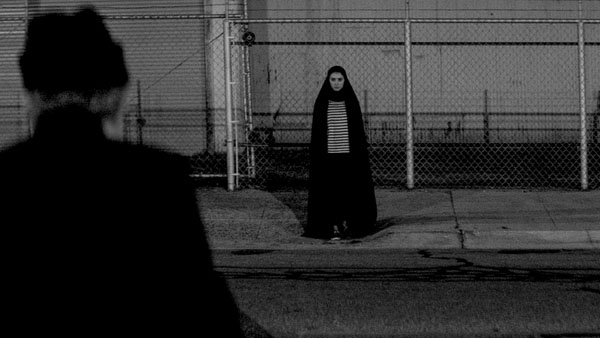New York’s Film Society of Lincoln Center and the Museum of Modern Art have announced the lineup for the the 43rd edition of New Directors/New Films, running from March 19 through 30. For full descriptions of the films, see Brian Brooks‘s entry at the FSLC. Here, though, is the quick overview with just a few notes here and there, and if titles are clickable, that means we’ve got a collection of reviews for you to look over.
Ana Lily Amirpour’s A Girl Walks Home Alone at Night. “‘Middle Eastern feminist vampire romance’ is likely to remain an underpopulated cinematic subgenre, but at least it now has a luminous standard-bearer,” writes Guy Lodge in Variety.
Iain Forsyth and Jane Pollard’s 20,000 Days on Earth. Salon‘s Andrew O’Hehir: “A gorgeous experimental documentary about post-punk Renaissance man Nick Cave, this film… has an emotional immediacy that goes well beyond its level of art-school pretension.”
Gillian Robespierre’s Obvious Child.
Jennifer Kent’s The Babadook.
Joel Potrykus’s Buzzard. ND/NF calls it “a darkly comical look at a slacker office temp who gets by on cold SpaghettiOs while getting off on stealing refund checks from his employer.” Screening with Dustin Guy Defa‘s Person to Person.
Justin Simien’s Dear White People.
Richard Ayoade’s The Double.
Shahram Mokri’s Fish & Cat. “A bold experiment in perpetual motion with an enigmatic time-warp narrative.”
Benjamín Naishtat’s History of Fear.
Tudor Cristian Jurgiu’s The Japanese Dog. “Pays loving homage to the tender and gently comical family dramas of Yasujiro Ozu.”
Gilles Deroo and Marianne Pistone’s Mouton. The “latest in a budding field of beautifully irreducible tales—blessed with the imprimatur of Locarno’s Opera Prima award—that refracts its subject through a prismatic approach to narrative,” writes Jay Kuehner in Cinema Scope.
Benedikt Erlingsson’s Of Horses and Men. “Set almost exclusively outdoors amid stunning Icelandic landscapes, the film features in equal parts a cast of exquisite short-legged Icelandic horses and human characters… illuminating with great inventive flair the relationship between man and beast.”
Andrei Gruzsniczki’s Quod Erat Demonstrandum. “Romania, mid-1980s…. [C]aptures both the atmosphere of mistrustful cautiousness and resigned discontent of its populace and the petty banality of the regime’s methods of surveillance and control.”
Talal Derki’s Return to Homs. “As immersive a documentary of active war as has ever been made.”
Abdellah Taïa’s Salvation Army. A ” bracing, deeply personal account of a young gay man’s awakening that avoids both cliché and the trappings of autobiography.”
Fabio Grassadonia and Antonio Piazza’s Salvo.
Anja Marquardt’s She’s Lost Control. For the Hollywood Reporter‘s David Rooney, this “austerely elegant first feature is a chilly psychological stroll through the minefield of other people’s emotional damage, with a title that doubles as a plot spoiler as to where the protagonist is headed–even if the film, by contrast, remains tightly wound.”
Ben Rivers and Ben Russell‘s A Spell to Ward Off the Darkness.
Roberto Minervini’s Stop the Pounding Heart. “It’s the power of the director’s nonintrusive handheld-camera style that reveals his protagonist’s spiritual and emotional inner turmoil.”
Albert Serra’s Story of My Death.
Hélène Cattet and Bruno Forzani‘s The Strange Color of Your Body’s Tears.
Ramon Zürcher’s The Strange Little Cat.
Alejandro Fernández Almendras’s To Kill a Man. A “quietly powerful character study that meditates on the ramifications of a family man’s choice to defend his kind,” finds Carlos Aguilar at Indiewire.
Vivian Qu’s Trap Street. “Noir in tone, and a great representation of the newest generation of Chinese filmmakers, Trap Street is a bold story of who is really watching who that, while firmly embedded in the current cultural context of China, could happen to any one of us.”
Jessica Oreck’s The Vanquishing of the Witch Baba Yaga. “Combines animation, traditional storytelling, and contemporary nonfiction filmmaking styles to recount the Slavic folktale.”
Hubert Sauper’s We Come as Friends. A “surreal, moving, infuriating and persuasive argument that in South Sudan there’s nothing ‘post’ about colonialism,” finds the New York Times‘ Manohla Dargis.
Tom Shoval’s Youth. This “gripping, haunting feature debut depicts the ill-advised kidnapping scheme of two Israeli brothers (real-life siblings Eitan and David Cunio) from preparation to aftermath.” Screening with Ruth Patir’s Shlomo X.
There are also two shorts programs. Again, for details, see the announcement.
For news and tips throughout the day every day, follow @KeyframeDaily on Twitter and/or the RSS feed. Get Keyframe Daily in your inbox by signing in at fandor.com/daily.




